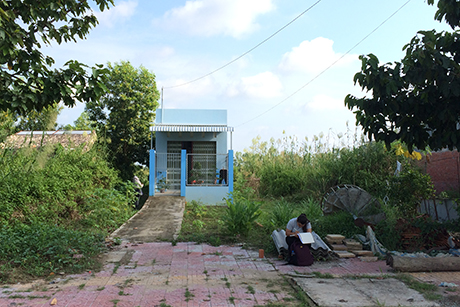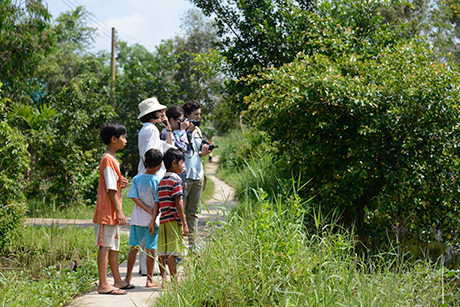Students survey urban aesthetics in Southeast Asia
By Rebecca Bowes


Cornell students in architecture, city planning, landscape architecture, anthropology, and Asian and religious studies, spent several days together in September touring Southeast Asian cities and exploring contemporary urban conditions in the region.
The joint field trip combined graduate and postgraduate students from Flux Navigations, a seminar for students in the humanities and design disciplines, and from Floating Cities: Mekong, an expanded practice studio for architecture students.
Both classes examined meta-issues in global urbanism, focusing on socio-cultural conditions in water-based Southeast Asian cities experiencing simultaneously the impacts of globalization and climate change. Bringing the two groups together to learn from one another was a central goal of the field trip.
“The idea was to decenter the students from their native disciplinary sensibilities,” said assistant professor of architecture Jeremy Foster, who co-taught both courses – Flux Navigations with Arnika Fuhrman, assistant professor of Southeast Asian studies in the College of Arts and Sciences, and Floating Cities: Mekong with Lily Chi, associate professor of architecture. “They were encouraged to draw intellectual connections between – and lines of inquiry that linked – their two approaches.”
Architecture students drew on the Mekong’s water traditions to explore design alternatives to current urban development in the city of Ca Mau, while seminar students examined the same traditions from a humanities perspective through cultural theory and analysis.
An expert on contemporary Vietnamese cityscapes, Kelly Shannon of the Oslo School of Architecture and Design was an important collaborator on the trip. She helped set up interactions with the local designers, guides and translators, and “smoothed the way with the local authorities to allow us to work in the city,” Foster said. “Her knowledge of the city helped structure the fieldwork.”
Once in Ca Mau, students were joined by Shannon, divided into mixed teams and given a range of field exercises that involved observing and mapping a variety of urban phenomena – including how informal activities and economies structured the public realm, and how the city’s natural areas contribute to livelihoods and to microclimate and hydrological management.
“The group exercise was enlightening for some of the seminar students,” Foster said. “Humanities students often talk about space but don’t have much occasion to think beyond text or theory. Being in situ in Southeast Asia with students used to working on an everyday basis with space in very material and practical ways was eye-opening.”
At the same time, the seminar students brought a distinct cultural and social sensibility to the fieldwork.
“One of the seminar students in my group really helped diversify my perception and understanding of Southeast Asia’s complex and nuanced cultural relationships,” said Jordan Berta, M.Arch. ’16. “This student had lived in Cambodia and pointed out the ways the two cultures [Cambodia and Vietnam], as well as most of the peninsula, associate with water.”
For an architecture student in the seminar, the trip was a chance to garner a new perspective.
Anamika Goyal, M.Arch. ’16, said: “It was my first experience at Cornell studying architecture as a form of cultural expression, just like food, music, textiles or dance. Unlike site visits in studio, I was simply trying to see and understand what was happening, and not looking for ways to fix or improve upon what was already there.”
Floating Cities: Mekong participants used analyses from the exercise to inform the development of new housing reflecting existing social patterns and practices while anticipating future economic, social and environmental challenges. For students in Flux Navigations, the trip was a chance to gather raw materials for a term assignment to document and evoke a distinctive local “urban phenomenon.” Their findings will be presented as digital mappings, videos, websites and installations in the John Hartell Gallery in the spring.
Flux Navigations is the second of a six-part seminar series funded by the Andrew D. Mellon Foundation. Mellon Collaborative Studies in Architecture, Urbanism and the Humanities brings together faculty and students from multiple colleges and disciplines to examine the city and its many representations, sharing and exploring methodologies, technologies and pedagogies. Project partners include the College of Architecture, Art and Planning, the Society for the Humanities, Cornell University Library and the Herbert F. Johnson Museum of Art.
Rebecca Bowes is a writer in the College of Architecture, Art and Planning.
Media Contact
Get Cornell news delivered right to your inbox.
Subscribe